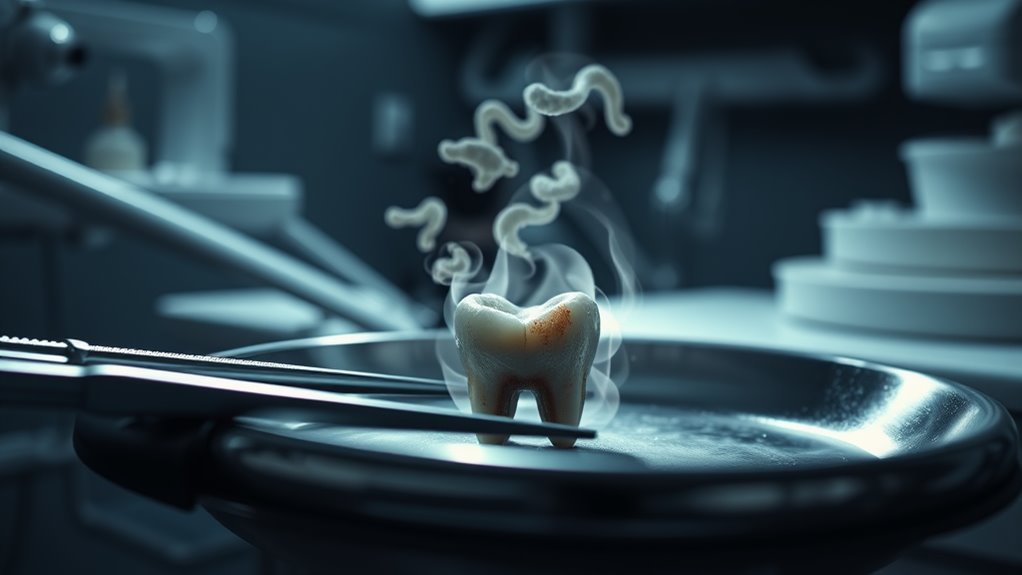Your Mouth Is Trying to Tell You Something! 7 Signs You Shouldn’t Ignore
Your mouth can be a telltale of your overall health. Don’t ignore signs like bleeding gums, persistent bad breath, or mouth sores; they may indicate gum disease or other issues. Loose teeth and dry mouth shouldn’t be overlooked either, as they can lead to serious complications. Plus, if your gums are swollen or painful, it’s a clear signal that something’s wrong. Stay tuned to discover more signs your mouth is revealing about your health.
Bleeding Gums
If you notice your gums bleeding when you brush or floss, don’t brush it off as a minor issue. This symptom often indicates gum disease, which can progress if left untreated. You might think it’s normal, but healthy gums shouldn’t bleed.
Pay attention to other signs like swelling or tenderness—these can signal inflammation. Ignoring bleeding gums can lead to more serious problems, including tooth loss and infections.
It’s crucial to maintain good oral hygiene, but if bleeding persists, schedule a visit with your dentist. They can assess your dental health and recommend treatments like deep cleaning or improved care routines.
Taking action now can prevent further complications and help keep your smile healthy and bright. Don’t wait—your mouth deserves attention!
Persistent Bad Breath
While occasional bad breath can happen to anyone, persistent bad breath—also known as halitosis—shouldn’t be ignored.
If you find that your breath consistently smells foul despite good oral hygiene, it might signal an underlying issue. Common causes include gum disease, tooth decay, or even dry mouth.
You might also want to take into account your diet, as certain foods can contribute to lingering odors.
If mouthwash and brushing don’t help, it’s time to consult a dentist. They can identify the root cause and recommend appropriate treatment.
Ignoring persistent bad breath can lead to more serious health concerns, so don’t brush it off.
Mouth Sores
Mouth sores can be another signal your body is sending you that shouldn’t be overlooked. These painful lesions can appear on your gums, tongue, or inside your cheeks, and they might stem from various causes.
Stress, hormonal changes, or even a vitamin deficiency can trigger these annoying sores. If you notice them frequently or they last more than a couple of weeks, it’s time to pay attention.
You might also experience discomfort while eating or speaking, which can affect your daily life. In some cases, mouth sores may indicate an underlying health issue, such as an autoimmune disorder or infection.
Don’t ignore these signs; consult with your healthcare provider to help identify the cause and find appropriate treatment options.
Loose Teeth
Loose teeth can be alarming, especially when you notice them shifting or feeling unstable. This isn’t just a sign of childhood; in adults, it often signals underlying issues.
Gum disease, for instance, can weaken the support around your teeth, leading to looseness. Additionally, tooth decay or trauma from an injury can also cause this unsettling symptom.
If you’re experiencing loose teeth, don’t ignore it. You might face severe consequences if you wait too long, such as tooth loss or further complications.
Schedule a visit to your dentist as soon as possible. They’ll assess your situation, identify the root cause, and recommend the right treatment to restore your dental health.
Changes in Taste
Experiencing changes in taste can be just as concerning as noticing loose teeth. If you suddenly find that your favorite foods taste bland or completely different, it’s a sign that something might be off.
This alteration can occur due to various reasons, including medications, infections, or even underlying health conditions. Sometimes, it’s linked to dental issues or oral hygiene problems.
You might also notice a metallic or bitter taste that wasn’t there before, which can be particularly alarming. Don’t brush it off; pay attention to these changes.
If they persist, it’s important to consult your dentist or healthcare provider. Addressing the root cause can help restore your taste and improve your overall well-being.
Dry Mouth
When you notice a persistent dry feeling in your mouth, it’s more than just a discomfort; it could signal an underlying issue. Dry mouth, or xerostomia, can lead to problems with eating, speaking, and swallowing. It’s often caused by dehydration, medication side effects, or certain health conditions.
| Symptoms | Possible Causes | What to Do |
|---|---|---|
| Difficulty swallowing | Dehydration | Drink more water |
| Bad breath | Medications | Talk to your doctor |
| Sticky feeling | Health conditions | Use saliva substitutes |
| Mouth sores | Anxiety or stress | Practice relaxation techniques |
If you’re experiencing dry mouth regularly, don’t ignore it. Addressing the root cause is essential for maintaining your oral health.
Swollen or Painful Gums
Swollen or painful gums can be a sign that your dental health needs attention. Ignoring these symptoms might lead to more serious issues, so it’s crucial to pay attention.
Here are three common causes for swollen or painful gums:
-
Gingivitis: This early stage of gum disease can cause inflammation and bleeding.
-
Infection: Bacterial infections can lead to abscesses, resulting in severe pain and swelling.
-
Hormonal Changes: Factors like pregnancy or menstruation can make your gums more sensitive.
If you’re experiencing swollen or painful gums, don’t brush it off.
Schedule an appointment with your dentist to identify the problem and get the necessary treatment. Your smile deserves the best care!
Frequently Asked Questions
How Can Diet Affect My Oral Health?
Your diet considerably impacts your oral health. Eating sugary or acidic foods can lead to cavities and enamel erosion, while a balanced diet rich in vitamins and minerals strengthens your teeth and gums, promoting overall wellness.
What Role Does Stress Play in Mouth Issues?
Stress can lead to various mouth issues, like teeth grinding or dry mouth. When you’re overwhelmed, your body’s response might tighten muscles and reduce saliva, increasing the risk of cavities and gum problems.
Are There Specific Medications Causing Oral Symptoms?
Yes, certain medications can cause oral symptoms. You might experience dry mouth, gum issues, or taste changes. It’s important to consult your doctor if you notice these effects after starting a new medication.
How Often Should I Visit the Dentist?
You should visit the dentist at least twice a year for regular check-ups and cleanings. This routine helps catch issues early, keeping your teeth and gums healthy, and guarantees you maintain a bright smile.
Can Oral Health Impact My Overall Health?
Yes, your oral health can greatly impact your overall health. Poor dental hygiene might lead to infections, heart disease, or diabetes complications. Regular checkups and good habits help maintain both your mouth and body in top shape.




